How Many Watts Does an RV Air Conditioner Use?
Is your RV's air conditioner not providing the same chilled drive like it used to? Well, there could be multiple reasons but the most common one is due to insufficient power. No one ever thinks about that. Therefore, RV owners must know how many watts does an EV air conditioner use and whether they are providing the right wattage.
RV AC's wattage varies, depending on size, brand, BTU, and the stage of consumption, among other external factors. This guide covers the wattage ranges of popular RV air conditioners' sizes and brands. Moreover, we will explain how to calculate the watts for your RV's AC. So, keep reading and learn all about making the right energy decisions for your off-grid RV load.
Basics of RV AC wattages and BTUs
For starters, across the USA and UK, air conditioning is rated in BTUs or British thermal units respectively. BTU indicates how much heat or energy an AC removes from any area within an hour. Hence, the higher the BTUs, the better its cooling capacity. Commonly, RV ACs come with a cooling capacity of 13,500 and 15,000 BTUs.
Likewise, wattage represents the energy consumption of an AC. It is the international measurement unit of power. For conversions, one watt is equal to 3.41 BTU per hour. Hence, for BTUs to watt conversion, you have to divide the BTU value by 3.41.
For instance, here is how you can convert the BTU into watts for a 13,500 BTU air conditioner.
- 1 wattage = 3.41 BTU
- 13,500 BTUs / 3.41 BTU = 3950 wattage.
- Or 15,000 BTUs / 3.41 BTU = 4400 wattage.
Understanding your RV AC's BTU and wattage makes it possible to select an appropriate generator for your power needs, depending on your location.
How many watts does an RV AC use?
The wattage required for an RV air conditioner is crucial, especially when using a generator or limited electrical resources. It mainly depends on your RV's size, brand, BTU, and the stage at which the AC is running. So let's discuss them in detail.
Starting watts vs running watts
When it comes to the stage at which your AC is running, you must be clear about two things, the starting watts and the running watts.
The starting watts are the energy required to start the AC unit, whereas the running watts are the power needed to keep it operating. Most RV air conditioners demand more power to start than to run. This is because it takes energy to start the compressor, the cooling component. Once it starts running and the unit reaches its operating range, the power demand decreases.
For instance, an average 13,500 BTU RV air conditioner typically requires 2,700 to 3,000 watts to start and 1,500 to 1,800 watts to run.
Common RV AC unit sizes and wattage
Here is a breakdown of the popular RV AC sizes along with their starting and running wattages.
| RV AC Size | Starting Wattage | Running Wattage | Total Energy Consumption |
| 7000 BTU | 1700 | 600 | 4,800 |
| 10,000 BTU | 2000 | 800 | 5,600 |
| 13,500 BTU | 2750 | 1,250 | 10,000 |
| 15,000 BTU | 3500 | 1,500 | 12,000 |
Wattage comparison table
As discussed earlier, the AC wattage also depends on the brand of your RV. Here is a quick summary of how different brands' RV ACs consume different wattages.
| RV AC Unit | BTU Rating | Starting Watts | Running Watts |
| Atwood Air Command | 13,500 BTU | 2,700 watts | 1,500 watts |
| Coleman-Mach 3 Power Saver | 13,500 BTU | 2,800 watts | 1,600 watts |
| Dometic Brisk II | 15,000 BTU | 3,200 watts | 1,900 watts |
Portable AC units
For campers, you may go for a smaller or portable AC unit. Most campers ACs starting wattage ranges from 1000 to 1200 watts, while its running power is half of what is needed to start the conditioning, 600-700 watts.
These air conditioning units are also power efficient for portions of a house or limited electrical supplies. That said, just like RVs, campers' sizes and brands can also influence their power consumption.
Factors affecting RV air conditioner wattage

Several things influence the wattage needed to operate an RV's air conditioning. Let's discuss them.
1. Size of the RV
Larger RVs have more area to cool. A small camper that requires specific heating, which means it can do with a 7,000 or 10,000 BTU AC. In comparison, a fully-featured, larger RV demands about 15000 BTU or even multiple AC units.
2. Ambient temperature and humidity
The outside temperature also dictates how long the RV air conditioner will be running. For instance, in higher temperatures, AC operates for longer periods.
3. Insulation quality in the RV
As earlier said, good insulation ensures that cold air is retained. Warm air is locked out, making it easier for the AC to regulate temperatures and maintain the room.
4. RV layout
The dimensions and the interior design of an RV help determine whether an AC unit is efficient enough to satisfy the demands. Bigger RVs or those with an open floor layout take more power to cool the air.
5. Power source and voltage fluctuations
Jittery power supply or upward and downward variations in voltage affect the performance and efficiency of an RV AC unit. If the voltage decreases or is irregular, the wattage used by the AC goes up, and the machine can be damaged.
Best Renogy solar kits for RV air conditioning

RV owners often experience power inconsistencies, especially with an AC running. In such a case, adding an off-grid power backup solution like a solar generator may help them facilitate their electricity needs. Here, solar kits might be helpful, as they can provide you power on the go. Plus, the scorching sun helps them generate even more power.
Renogy 100W monocrystalline solar panel
Perfect for solo travelers and RVs, this Renogy 100W solar panel has a lightweight aluminum structure with shatter-resistant glass. It is equally simple to mount with pre-drilled holes. Plus, the Grade-A monocrystalline solar cells are significantly more energy efficient than conventional options.
- 500 Watt-hours of electricity per day.
- 10-year workmanship warranty.
- 25-year 80% output warranty.
400 Watt 12-volt solar RV kit
These Renogy solar kits are ideal for larger RVs or those with up to 21% solar cell efficiency. The kit provides sufficient energy for your AC and other appliances. Moreover they are super easy to install with all the step-by-step instructions in the manual. The small stylish design makes it super cool for your RV's exterior, best choice for travelers.
- Grade A+ solar cells energy yield up to 30%
- More energy, even in partially shaded areas
- Better resistance to vibration for flexible mounting
Tips for improving RV air conditioner efficiency

A better RV air conditioner's efficiency will save energy and give you comfort. You can follow these tips to reduce power consumption:
1. Improve insulation
Good insulation is key to keeping your RV cool. Consider using insulation panels in windows and doors to prevent heat from entering. Adding weatherstripping can also help seal any gaps that let warm air in.
2. Use shade and reflective covers
Position your RV in shaded areas whenever possible. Using reflective covers on windows can block sunlight and keep the interior cooler. Awnings can also provide additional shade, reducing the load on your AC.
3. Employ additional fans
Ceiling fans or portable fans can circulate cool air more effectively, allowing your AC to consume less power. Fans use significantly less energy and can help distribute cool air throughout the RV.
4. Schedule use wisely
When you run your AC in cooler parts of the day, this will reduce the energy load. Early morning or late evening is the best time to turn your AC on.
How to calculate the power consumption of an RV AC?
Before you buy an AC unit for an EV, it is important to understand these basic power calculations to choose the right one:
1. Understand power consumption
AC units have two types of wattage: running watts and starting watts. In simple words, the running watts are the energy required to keep the appliance running, whereas the starting watts are the power needed to start the appliance. Usually, starting watts for most electronics are twice or thrice their running watts.
2. Calculate the Wattages
Running Wattage Formula
- Running Wattage = BTUs / 2
Starting Wattage Formula
- Starting Wattage = Running Wattage × (1.5 - 3)
Example: For a 12,000 BTU RV air conditioner,
Running Wattage would be,
- 12,000BTUs / 2 = 6,000watts
The starting Wattage would be,
- Minimum starting wattage: 6,000 watt x 1.5 = 9,000 watts
- Minimum starting wattage: 6,000 watt x 2 = 12,000 watts
3. Using a Wattage meter
A wattage meter can help you measure actual power consumption. Simply plug it into an outlet and connect your AC unit. The meter will display real-time power usage, showing running and starting watts.
FAQs
Can I run my RV AC with a 2000-watt generator?
Yes, you can run portable RV air conditioners with a 2000-watt generator. A standard compact RV 7000 BTU AC units require around 600 running watts and a higher starting watts of up to 1700 watts.
In principle, you may run a portable AC with a 2000-watt generator but may experience some power instability. Moreover, a 2000-watt generator is insufficient to facilitate medium-to-larger RV AC units.
What size generator do I need for RV AC when off-grid?
A 3,000-4,000-watt generator is recommended to handle most RV AC units' running and starting watts. This capacity allows for additional appliances, providing a safety margin during peak demand.
That said, your AC's size and brand dictates the right generator size for your setup. Moreover, most RV owners, today, employ solar generators as a backup solution to manage their power needs and reduce their electricity costs.
How many watts does a camper AC use?
A camper AC uses 1,200 to 1,500 running watts. However, their starting wattage is significantly higher, up to 2,000 to 3,000 watts. The exact wattage depends on the AC unit's size and efficiency rating. Consult the manufacturer's specifications for accurate wattage figures for the right power source.
Conclusion
Knowing how many watts your RV air conditioner uses is key to managing your energy needs, especially for off-grid system generators. With this clarity, you can better plan your trips. If your RV falls in the medium to larger category, you should always consider high-wattage solar generators. These are energy-efficient and affordable.
That said, it is equally important to adopt some best practices for optimized energy usage. For instance, you can significantly reduce power consumption with improved insulation, shade use, and investment in efficient equipment.
Enjoy the great outdoors with peace of mind and a smaller energy footprint!











